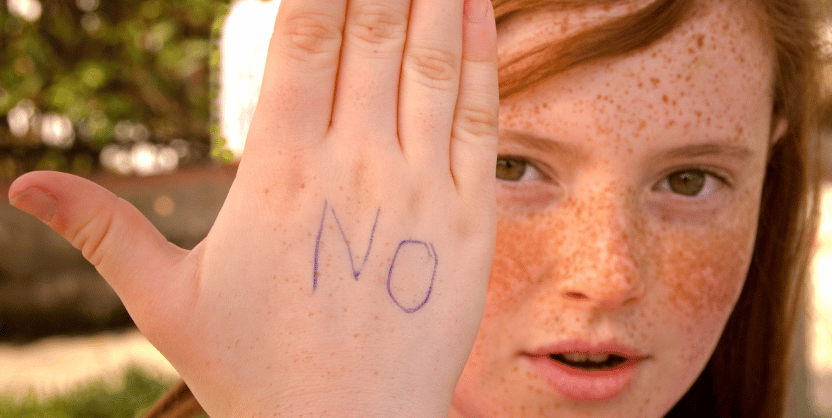Being a parent, you talk to your children about various topics to educate and to keep them safe. Some topics may be easier to talk about than others. One uneasy but most important topic is sexual abuse. You have nothing to worry about because everydayfeminism.com lists 10 ways to talk to your kids about sexual abuse.
Frame the conversation for yourself as a way of loving your child:
Starting from a loving place and not a scared place will help create the calm environment for your child. This will help them really listen to the words you’re saying. If you’re frightened and stressed, they will react primarily to that fear and not register what you’re saying as much.
It’s also important to not treat the subject like its taboo or dirty (which is how we often treat anything related to sex). Even when parents try to hide their feelings, children are often very perceptive and pick up on small cues telling them that something is wrong.
They then may think talking about someone hurting them might be wrong even if you say it’s not. So, speak from a calm, casual, and loving frame of mind when having these conversations.
Begin talking to them as young as 2 years old:
This may seem very early but children under 12 are most at risk at 4 years old. Even if they can’t speak well, children at this age are busy figuring out the world. And they certainly understand and remember a lot more than adults usually realize.
For example, when giving a bath, tell them where their private parts are and that the parent is seeing and touching them to clean them but that normally nobody should.
Teach them the actual names of their private parts:
When you begin teaching them parts of their body like ears, eyes, and toes, also teach them the real names of their private parts like “vagina” and “penis” and not their “cute” names. This gives them the right words to use if someone is hurting them and makes sure the person being told understands what’s happening. It’s also important to teach both female and male anatomy because the abuser can be of any gender and they need to know how to describe what happens to them.
In one case, a child told her parent that her stomach was hurting. When they took her to the doctor, he informed them that her vagina showed signs of rape. Their little daughter had been trying to tell them what was happening, but she just didn’t know what to call her vagina. So, she said stomach instead.
Share the only instances when their private parts can be seen and touched:
An age appropriate concept for a young child to understand is that nobody – including a parent or caregiver – should see or touch their private parts (what a swimming suit covers up) – unless they’re keeping them clean, safe, or healthy.
But also make sure they know that even in these situations, if someone is hurting them, they can still say, “stop, it hurts” and tell their parent immediately.
Some examples to help them understand what you’re talking about are when you’re giving them a bath, or a doctor is seeing them. Ask them if that’s an example of keeping them clean, safe, or healthy as you’re doing it.
Teach them that private parts are special:
When talking about this topic, it’s important to not create a taboo or dirty feeling around their private parts. Instead parents can teach their child that their private parts are so special that they’re just for them and no one else, unless someone is helping them keep their private parts clean, safe, or healthy.
You can also ask them what it feels like when someone is touching them. They’re in order to keep it clean, safe, or healthy. This will help them understand the difference between that type of touching and someone touching them sexually.
Also explain that if someone is making them feel “tingly and nice” in their private parts, it’s still not appropriate and they should tell you immediately. It’s important to not make them wrong or ashamed for having any sexual pleasure since many children do touch themselves. Instead make it clear that it’s a problem if someone else is doing it to them.
It’s also important to teach them that it’s inappropriate to touch other people’s private parts, even if an adult asks them to. And if someone does, they should tell you immediately.
This is an important step to help children develop a healthy sexuality before discussing sex itself with them. When they are older, of course, you can have the conversation about when it is appropriate to touch another person’s private parts and give and receive sexual pleasure.
Teach them (and respect) their right to control their bodies:
This flies in the face of what we often teach our children – that adults have absolute authority over everything and children have to do what they’re told. The problem is that this only teaches them to not speak up when they’re feeling hurt and scared because of what an adult is telling them to do.
Instead, teach your child that their body is theirs and no one has the right to hurt their bodies even when a grown up is doing it. For children, it’s very empowering to have permission to say “no” to an adult if they’re uncomfortable with the request.
For example, when you’re at a social event, don’t make your child kiss or hug anyone. Instead let your child know they can give a kiss, hug, handshake, or nothing to people they see and it’s entirely up to them. And when an adult tries to make them give them a hug and they don’t want to, encourage the child to say “no” and support their decision verbally if needed.
Explain that no one should physically hurt them, especially in their private parts:
85% of child sexual abuse is perpetrated by someone they know. It may be a parent, relative, family friend, neighbor, teacher, or religious leader. It may be a man, woman, or another child.
It can be anyone. No one unfortunately is on the safe list. In fact, children are most vulnerable with the family members and acquaintances. So, make sure your child knows that no one can hurt their bodies no matter who they’re with – even when they’re with their parent.
It’s also important that they understand you’re talking to them about this because you love them and want them to be safe. Just like you teach them about crossing the road because they might get hit by a car, you’re also teaching them that someone might sexually hurt them. It doesn’t mean it will happen.
But in case someone tries to, your child will know they can say “no, stop that” and tell you what happened without you being upset with them
Encourage them to trust their gut around their safety:
While parents shouldn’t instill a fear of people in their child, they should support their child in trusting their gut instinct. By trusting their intuition, children will both be more empowered around making their own choices about who’s safe instead of relying primarily on what a parent told them. This is important because a parent won’t always be there with them.
One way is to tell the child before social events that if they ever feel uncomfortable with someone – even if nothing has happened, they can leave the room and tell their parent. Even if it looks “rude,” they should know that they will not be punished for simply leaving the room. Their sense of safety comes before the need to be “polite.
Explain that a secret is still a secret when shared with the parents:
Many abusers tell their child victims that what happened was a secret and to not tell anyone, especially their parents. So, it’s important to teach them early on that secrets are kept secret if they tell their mom or dad.
Additionally, they should understand anyone who wants them to keep secrets from their parents shouldn’t be trusted and they should tell their parents about it
Tell them that you will believe them if someone is hurting them and they won’t be in trouble:
Many abusers tell their victims that no one will believe them and create a sense of shame around what happened. Children in general, usually blame themselves and take responsibility for things that happen in their lives, regardless of who’s responsible for it.
Given this, children often fear what their parent will do if they tell them, including being punished. Make sure they know without a doubt that you won’t be upset, that they’ve done the right thing, and that you’re proud of them for telling them the truth.
Sexual abuse may not be the easiest topic to cover with your children but using these tips it can be done. This will put you mind at ease knowing that they are well informed and that they can come talk to you. Children are our future and they need to be protected
Do you know your score?
Discover your ACE score and unlock a new understanding of your life. Take the test and gain insights into how your early experiences shape your well-being. Don't let your past define you – empower yourself with knowledge.

Joanne Marszal
Author
I live in West Palm Beach Florida and I have a Multimedia Journalism degree from Florida Atlantic University. Writing is my passion. I love helping people with information they need to know.
